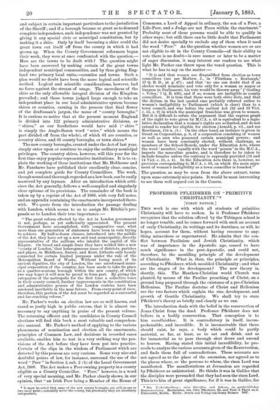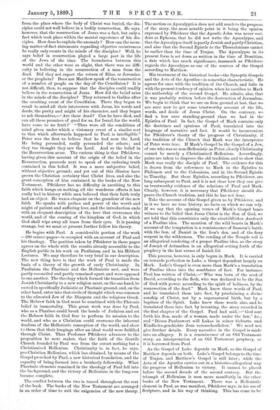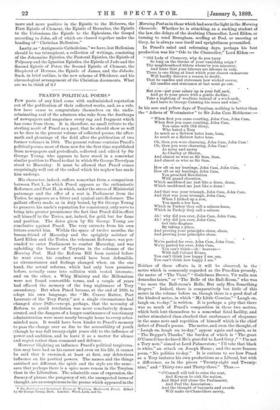PROFESSOR PFLEIDERER ON " PRIMITIVE CHRISTIANITY." * {FIRST NOTICE.] Tins work is
one with which all students of primitive Christianity will have to reckon. In it Professor Pfleiderer recognises that the solution offered by the Tubingen school is no longer tenable, and he comes forward with such an account of early Christianity, its writings and its doctrines, as will, he hopes, account for them, without having recourse to any- thing miraculous or supernatural. He admits that the con- flict between Paulinism and Jewish Christianity, which was of importance in the Apostolic age, ceased to have much significance in the post-Apostolic, and could not, therefore, be the moulding principle of the development of Christianity. What is, then, the principle or principles, according to Pfleiderer, which moulded Christianity ; and what are the stages of its development P The new theory is, shortly, this. The Heathen-Christian world Church was planted, by means of the Pauline preaching of Christ, on a ground long prepared through the existence of a pre-Christian Hellenism. The Pauline doctrine of Christ and Hellenism are the two factors which explain the rise, development, and growth of Gentile Christianity. We shall try to state Pfleiderer's theory as briefly and clearly as we can.
The introduction deals with the belief in the resurrection of Jesus Christ from the dead. Professor Pileiderer does not believe in a bodily resurrection. That conception is to him unvoliziehbar. It is contradictory in itself, incom- prehensible, and incredible. It is inconceivable that there should exist, he says, a body which could be partly material, so far, at least, as to eat and drink, and so far immaterial as to pass through shut doors and ascend to heaven. Having stated this initial incredibility, he pro- ceeds to analyse the various accounts given of the Resurrection, and finds them full of contradictions. These accounts are not agreed as to the place of the ascension, nor agreed as to the places where, or the persons to whom, the risen Lord was manifested. The manifestations at Jerusalem are regarded by Pfleiderer as unhistorical. He thinks it was in Galilee that the disciples were persuaded that they had seen the risen Lord. This is to him of great significance, for if it was in Galilee, far • Des Urchristenthem seine Scheiften sad Lehren, ire geschichtlichen Zusammenhang. Beschrieben von Otto Piteiderer, Dr. mid Prof. d. TheoL an d. lJniversitlit, Berlin. Berlin : Druck end Verlag Ton Georg Reimer. 1887.
from the place where the body of Christ was buried, the dis- ciples could not well believe in a bodily resurrection. He says, however, that the resurrection of Jesus was a fact, but only a fact which took place within the mental experience of his dis- ciples. How does he explain the anomaly ? How can the seem- ing matter-of-fact statements regarding objective occurrences be really only events in the minds of the disciples ? Well, he says belief in resurrection played a large part in the life of the Jews of the time. The boundaries between this world and the other were so slight, that there was no diffi- culty in believing in the resurrection of a man from the dead. Did they not expect the return of Elias, or Jeremias, or the prophets? Does not Matthew speak of the resurrection of a number of people on the day of the Crucifixion ? It is not difficult, then, to suppose that the disciples could readily believe in the resurrection of Jesus. How did the belief arise in the minds of the disciples P They returned to Galilee after the crushing event of the Crucifixion. There they began to recall to mind all their intercourse with Jesus, his words and deeds, the purity and might of his character, and they began to ask themselves,—` Are these dead? Can he have died, and can all these promises of good for us, for Israel, for the world, have come to no fruit ?' "Thus were all the conditions of mind given under which a visionary event of a similar sort to that which afterwards happened to Paul, is intelligible." Peter was the first to believe that he had seen the Lord. He being persuaded, easily persuaded the others ; and they too thought they saw the Lord. And so the belief in the Resurrection arose. The curious thing is that Pfleiderer, having given this account of the origin of the belief in the Resurrection, proceeds next to speak of the enduring truth contained in this belief. It was a mere subjective belief, without objective ground ; and yet out of this illusion have grown the Christian certainty that Christ lives, and also the great conception of him contained in the books of the New Testament. Pfleiderer has no difficulty in ascribing to this faith which hangs on nothing, all the wondrous effects it has really had in history while men believed that their faith truly had an object. He waxes eloquent on the grandeur of the new faith. He speaks with pathos and power of the worth and might of patient and suffering love, and the introduction ends with an eloquent description of the love that overcomes the world, and of the coming of the kingdom of God, in which God shall wipe away all tears from their eyes. It is passing strange, but we must at present further follow his theory.
He begins with Paul. A considerable portion of the work —280 octavo pages—is occupied with an account of Paul and his theology. The position taken by Pfleiderer in these pages agrees on the whole with the results already accessible to the English public in his work on Paulinism, and in his Hibbert Lectures. We may therefore be very brief in our description. The new thing here is that the work of Paul is made the basis of a theory of the growth of early Christianity. In Paulinism the Pharisaic and the Hellenistic met, and were partly reconciled and partly remained apart, and were opposed to one another. The theology which formed the transition from Jewish Christianity to a new religion must, on the one hand, be rooted in specifically Judaistic or Pharisaic ground, and, on the other hand, enter into that circle of thought which was common to the educated Jew of the Diaspora and the religious Greek. The Hebrew faith in God must be combined with the Platonic belief in immortality. This great work was done by Paul, who as a Pharisee could break the bonds of Judaism and set the Hebrew faith in God free to perform its mission to the world, and -who as a Christian could overcome the inherent dualism of the Hellenistic conception of the world, and show to them that their longings after an ideal world were fulfilled through Christ. Thus Professor Pfleiderer advances to the proposition he next makes, that the faith of the Gentile Church founded by Paul was from the outset nothing but a Christianised Hellenism. Christianity is, in fact, he says, pre-Christian Hellenism, which has obtained, by means of the Gospel preached by Paul, a new historical foundation, and the capacity of being formed into a brotherly fellowship. What Pharisaic elements remained in the theology of Paul fell into the background, and the victory of Hellenism in the long-run became complete.
The conflict between the two is traced throughout the rest of the book. The books of the New Testament are arranged in an order of time to suit the exigencies of the new theory. The section on Apocalyptics does not add much to the progress of the story, the most notable point in it being the opinion expressed by Pfleiderer that the Apostle John was never resi- dent at Ephesus, that he did not write the Apocalypse, and that the Apocalypse itself is partly Jewish and partly Christian, and also that the Second Epistle to the Thessalonians cannot be earlier than the time of Trajan. The Apocalypse in its present form is set down as written in the time of Domitian, a date which has much significance, inasmuch as Pfleiderer regards the Apocalypse as one of the sources of the Gospel according to Matthew.
His treatment of the historical books—the Synoptic Gospels and the Acts of the Apostles—is somewhat characteristic. He agrees for once with the tradition of the Church, and falls in with the present tendency of opinion, when he ascribes to Mark the authorship of the second Gospel. He admits, also, that it was probably written before the destruction of Jerusalem. We begin to think that we are on firm ground at last, that we are sure now to get some trustworthy account of the life, words, and deeds of Jesus Christ. On the contrary, we find a less sure standing-ground than we had in the Epistles of Paul. In fact, the Gospel of Mark contains only the doctrines and opinions of Paul, translated into the language of narrative and fact. It would be inconvenient for Pfleiderer's theory of the progress of Christianity, if the tradition of the Church that Mark was the interpreter of Peter were true. If Mark's Gospel be the Gospel of a Jew, of one who was so non-Hellenistic as Peter, clearly Christianity cannot be merely a Christianised Hellenism. Accordingly, pains are taken to disprove the old tradition, and to show that Mark was really the disciple of Paul. The evidence for this is drawn from the references to Mark in the Epistles to Philemon and to the Colossians, and in the Second Epistle to Timothy. But these Epistles, according to Pfleiderer, are long subsequent to Paul, and it is not clear how they can give us trustworthy evidence of the relations of Paul and Mark. Clearly, however, it is necessary that Pfleiderer should dis- prove the Church tradition, and this he has not done.
Take the account of this Gospel given us by Pfleiderer, and in it we have no true history, no facts on which we can rely. If we say that the opening verses of Mark's Gospel bears witness to the belief that Jesus Christ is the Son of God, we are told that this constitutes only the sinnbildlichen Ausdruck of a Pauline idea. The mention of the wild beasts in Mark's account of the temptation is a reminiscence of Samson's battle with the lion, of Daniel in the lion's den, and of the fiery serpent in the wilderness. The rending of the Temple veil is an allegorical rendering of a proper Pauline idea, as the story of Joseph of Aiimathea is an allegorical setting forth of the prophecy in the last verses of Isaiah liii.
This process, however, is only begun in Mark. It is carried on towards perfection in Luke, a Gospel dependent largely on Mark. Luke's Gospel is even more than Mark's a translation of Pauline ideas into the semblance of fact. For instance, Paul has written of Christ,—" Who was born of the seed of David, according to the flesh, who was declared to be the Son of God with power. according to the spirit of holiness, by the restuTection of the dead." Mark knew these words of Paul, and he translated them into fact, by proclaiming a divine sonship of Christ, not by a supernatural birth, but by a baptism of the Spirit. Luke knew these words also, and he translated them into fact by inventing the story recorded in the first chapter of the Gospel. Paul had said,—" God sent forth his Son, made of a woman, made under the law," &c. ; and " Dieses Pauluswort will Lukas in seiner Geburts- mid Kindheits-geschichte Jesu veranschaulichen." We need not give further details. Every narrative in the Gospel is made into an allegory. It is a reminiscence of an Old Testament story, an interpretation of an Old Testament prophecy, or it is borrowed from Paul.
As the Gospel of Luke depends on Mark, so the Gospel of Matthew depends on both. Luke's Gospel belongs to the time of Trajan, and Matthew's Gospel is still later ; while the Acts of the Apostles carries out in a historico-allegorical way the progress of Hellenism to victory. It cannot be placed before the second decade of the second century. But the triumph of Hellenism is seen more manifestly in the other books of the New Testament. There was a Hellenistic element in Paul, as was manifest, Pfleiderer says, in his use of Scripture, and in his way of thinking. This has come to be more and more positive in the Epistle to the Hebrews, the First Epistle of Clement, the Epistle of Barnabas, the Epistle to the Colossians, the Epistle to the Ephesians, the Gospel according to John, all of which are classed together under the heading of "Christian Hellenism."
Lastly, as "Antignostic Catholicism," we have, lest Hellenism should be too triumphant, a collection of writings, consisting of the Johaxmine Epistles, the Pastoral Epistles, the Epistle of Polycarp and the Ignatian Epistles, the Epistle of Jude and the Second Epistle of Peter, the Second Epistle of Clement, the Shepherd of Hermas, the Epistle of James, and the didache. Such, in brief outline, is the new scheme of Pfleiderer, and his chronological arrangement of the Christian documents. What are we to think of it ?
















































 Previous page
Previous page